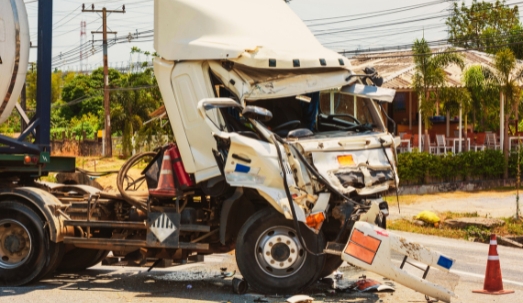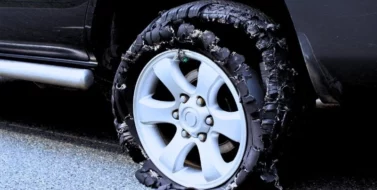Before filing a lawsuit against a negligent trucker or trucking company, injured victims often ask, “What can I sue for in a truck accident lawsuit?”

If you suffered severe injuries in a Chicago truck accident, you can sue for various types of damages. You may be able to recover compensation for your medical bills, lowered quality of life, lost income, loss of future earnings, and pain and suffering. Even if you believe you were partly at fault or that you do not have a case, it’s worth discussing your situation with a truck accident lawyer. Many factors, such as FMCSA violations, may impact claims against common carriers like truck drivers and trucking companies.
Table of Contents
What Can You Sue for After a Truck Accident?
Semi-trucks are so much bigger and heavier than passenger cars that the occupant of smaller vehicles are especially vulnerable if an accident occurs. Victims often suffer permanent injuries that impact them for the rest of their lives. The financial burdens that accompany truck accident injuries can easily soar to the hundreds of thousands, or even millions of dollars. Fortunately, accident victims may be able to sue the truck driver, the insurer, the trucking company, and others to recover compensation.
Suing for Medical Expenses in a Truck Accident Lawsuit
Your healthcare costs after a truck accident are likely to be high. You can file a lawsuit to recover compensation for your medical expenses that stem from the accident. Emergency room care, hospitalization, medications, procedures, X-rays, surgeries, transportation to and from appointments, physical therapy, pain management, in-home nursing care, medical devices and equipment, and even future medical costs should be included in your claim. Chicago truck accident lawyers can help you provide evidence of your past, current, and future medical expenses.
Recovering Compensation for Lost Income
If your truck accident injuries prevent you from returning to work or prevent you from earning the same income you earned before the crash, you may be able to recover compensation for your lost wages. Pay stubs and self-employment records can be used as evidence to demonstrate your lost income.
Suing for Lost Future Earnings
You can sue for a loss of future earnings if the accident left you with a disability or otherwise unable to work to the extent you did before the accident. Child victims can sue for a loss of future earnings too if they suffer injuries that change their ability to work to the same extent they would have been able to had they not been injured.
Recovering Fatal Accident Damages
If your loved ones passed away due to a truck accident, you may be able to file a wrongful death lawsuit. You can seek a settlement that covers funeral and burial costs, medical bills, and more. You may also be able to receive compensation for non-economic damages, such as loss of consortium and loss of services. They relate to the impact someone else’s death (or injury) has on your companionship, relationship, and support.
Filing a lawsuit for Pain and Suffering, Lowered Quality of Life
In the aftermath of a truck accident, you may not be able to do most of the things you could before. The traumatic event could harm your emotional health and even cause depression. You might be left with severe pain, disfigurement, or PTSD.
Pain and suffering cover emotional, mental, and physical suffering. These are not easily quantifiable economic losses. Your attorney will consider the severity of your injuries, your lowered quality of life, what you have missed out on and will miss, your physical pain, emotional turmoil, disfigurements, scars, and the permanency of your conditions to calculate these non-economic damages.
Types of Damages Available in a Truck Accident Case
There are generally three types of damages available in a truck accident lawsuit in Illinois. The most common types are economic damages and non-economic damages. In some cases, victims may be able to recover punitive damages as well.
Suing for Economic Damages in a Trucking Accident
If your accident injuries required medical attention, or you were unable to work after the crash, you can sue to recover compensation for your financial losses. In addition to recovering your lost wages, you may be able to receive compensation for your medical expenses, including hospital stays, doctor visits, medications, and follow-up care. Since these types of expenses can be verified with billing statements, wage statements, and receipts, they are fairly easy to calculate.
Recovering Non-Economic Damages
Truck accidents can leave victims with lingering psychological trauma and physical pain that is not associated with a monetary value. If your crash left you with PTSD, anxiety, depression, physical pain, or the inability to enjoy life as you did before the accident, you can sue to recover compensation. Since you won’t have financial statements or receipts to account for your losses, your accident lawyer will base their value on your economic losses.
Punitive Damages in Truck Accident Cases
Punitive damages are reserved for cases in which the wrongdoer’s actions were especially egregious. While these types of damages are not common, they are sometimes awarded if the trucker was drunk or impaired by drugs, knowingly violated FMCSA regulations, or was determined to have been grossly negligent. Unlike compensable damages, which are intended to make the victim “whole” again, punitive damages are designed to punish the at-fault party.
Factors that Impact the Value of a Truck Accident Claim
Various factors affect the value of a truck accident claim. They include but are not limited to, your injuries (their nature and severity), your medical expenses, whether you have some contributory negligence for the accident, the cause of the crash, and the available sources of recovery.
Sometimes, truck and auto accident settlements exceed the policy limits. If you are likely to recover within a few weeks and not need long-term care and support, the value of your truck accident claim is on the lower side and probably under policy limits. However, if you require long-term hospitalization, surgeries, home care, and rehabilitation, the value of your claim increases. Herniated disc injuries, loss of a limb, traumatic brain injuries, and severe burns are examples of catastrophic injuries that usually exceed policy limits.
You are not necessarily out of luck for receiving full compensation if your economic and non-economic losses exceed the trucker’s liability insurance policy’s limits. Your attorney may be able to identify other sources of recovery to pay for your losses.
The Evidence to Prove Fault in a Truck Accident Claim
Dispatch records, GPS tracking, and eyewitnesses are some examples of evidence in a truck crash case.
Dispatch records show the driver’s route, the nature of the job, and the details of the delivery or work assignment. In the dispatch records, you find how long drivers were behind the wheel and if they were overworked and possibly fatigued.
Cameras come standard on many semi-trailers. Camera or video footage may show erratic driving, tailgating, or other negligent or reckless behaviors by the truck driver.
Black boxes don’t just come on planes. Trucks have them too, and they record data electronically. Looking at the black box can show the driver’s steering habits, when a driver pumped the brakes, and how fast the truck was going.
GPS tracking devices come standard on many trucks. The devices can sometimes help indicate what happened before, during, and after a collision.
Eyewitnesses can turn over phone or video footage if they happened to be recording when the accident occurred. Consistent statements may paint a clear picture of liability.
Medical evidence is important as well. See a doctor as soon as possible after a truck crash to establish documentation. Clear, direct lines between an accident and injuries can make your case.
How Does Comparative Negligence Impact Your Ability to Sue for a Truck Accident?
Under modified competitive negligence, which is the standard for recovery in tort cases in Illinois, you may still be able to file a lawsuit and recover compensation for your losses even if your actions contributed to an accident. As long as you are determined to have been less than 50% at fault for the crash, you can sue the negligent trucker, trucking company, or other parties. Ultimately, your award will be reduced in proportion to your role in the accident.
For example, if you were 20% at fault for the accident, and your damages totaled $100,000, you would receive 80%, or $80,000 in compensation. If you are 50% or more at fault for the crash, however, you probably won’t be entitled to compensation.
Who You Can Sue in a Truck Accident Case
You may be wondering, “Who can I sue for a truck crash?” Many truck accident cases involve multiple at-fault parties and insurance policies. Even if your case involves only one at-fault party, that party could still carry coverage through multiple insurance policies.
Possible defendants in a trucking accident case may include:
The Truck Driver
You may be able to sue the truck driver that caused your accident if the crash happened because of his or her intentional or negligent actions. For instance, if the trucker was driving while distracted or impaired, you can sue the trucker. In most cases, the truck driver’s liability insurance company will pick up the tab for your losses.
The Trucking Company
So, can you sue a trucking company? In many cases, the trucking company that employs the trucker can be held liable for accident injuries, and you can file a lawsuit against a trucking company. This is especially common in cases where the company encouraged the driver to violate hours of service regulations, allowed an untrained driver to haul a load, or hired a driver that was known to be unsafe. Factors such as these make it possible to sue a trucking company.
Manufacturers
If a defective car or truck part caused your crash, you can sue the manufacturer in a product liability lawsuit. Manufacturers are often held liable for trucking accidents when defective tires blow out, braking systems fail, and other mechanical issues cause a semi-truck to go out of control.
Contributing Factors in Commercial Truck Accidents
To help you determine how to proceed with your lawsuit, your truck accident lawyer will evaluate your case and identify the cause(s) of your crash. In Illinois, various factors frequently contribute to commercial truck accidents. These include, but are not limited to:
Truck Driver Fatigue
Truck driver fatigue is a top cause of trucking accidents in Illinois. The shortage of truck drivers across the United States has only made the problem worse in recent years. To help company truck driver fatigue, the FMCSA has regulated the number of hours truck drivers are allowed to drive. “Hours of service” regulations require commercial trucks to be equipped with electronic monitoring systems that log trucker hours.
Impaired Driving
To help them stay awake during long hauls, many truck drivers turn to illegal substances. Unfortunately, stimulants can significantly impact truckers’ ability to operate their vehicles. They may become overly responsive to stimuli, drive aggressively, or make jerky movements that can cause a crash. When truckers “come down” from these drugs, they are more likely to fall asleep behind the wheel.
Blind Spots
Various locations that surround a large commercial truck are unable to be seen by the driver. Although mirrors and cameras help truckers see what’s around them, blind spot accidents are still a common problem. When passengers car enter these “blind spots”, truckers may maneuver their trucks in such a way that cuts passenger cars off, causes the truck to run into the smaller vehicle, or runs the car off the road.
Speeding
Most truckers are paid by the number of miles driven, not by the hour. In a rush to drop off their load and pick up the next one, truck drivers commonly speed. At approximately 80,000 pounds, it can take a truck traveling at 55 mph the length of a football field to stop. When speeds increase, so do stopping distances. Additionally, speeding makes it more difficult to control a large commercial truck, increasing the risk of an accident.





